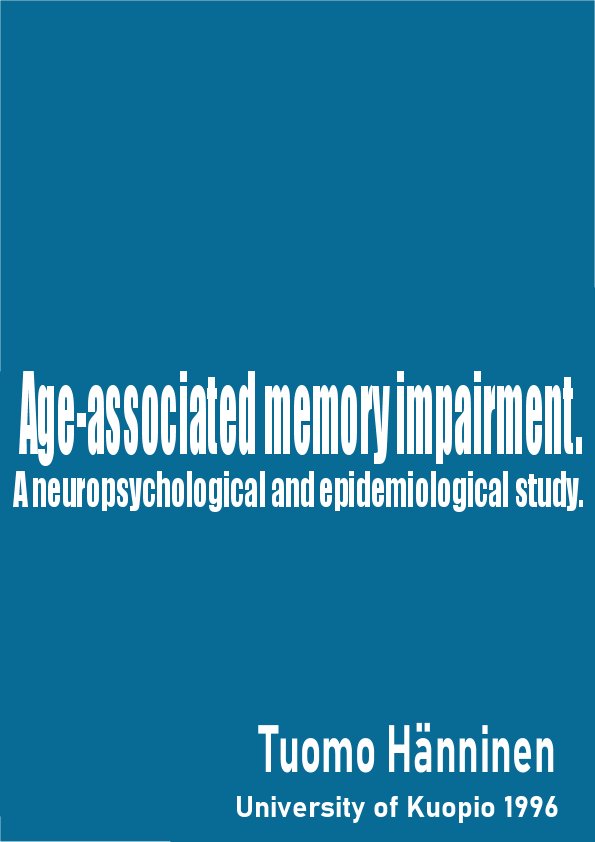Download Age-associated memory impairment. A neuropsychological and epidemiological study. PDF Free - Full Version
Download Age-associated memory impairment. A neuropsychological and epidemiological study. by Tuomo Hänninen in PDF format completely FREE. No registration required, no payment needed. Get instant access to this valuable resource on PDFdrive.to!
About Age-associated memory impairment. A neuropsychological and epidemiological study.
The aim of this study was to characterize the neuropsychological and epidemiological aspects involved in diagnosing age-related changes in cognition. The properties of the diagnostic criteria for age-associated memory impairment (AAMI) proposed by the National Institute of Mental Health and for age-associated cognitive decline (AACD) proposed by the International Psychogeriatric Association were evaluated in a large random sample and in smaller select groups of elderly subjects.<br><br>According to the high prevalence of AAMI found in the present study, AAMI appeared likely to be a phenomenon of normal aging rather than a continuum from normal aging to a pathologic state such as Alzheimer's disease. As in some previous studies, the neuropsychological methods used for AAMI diagnosis also appeared ambiguous in this study. The follow-up of AAMI subjects suggested that AAMI, in general, is nonprogressive, but that the AAMI population also includes subjects with very early dementia. However, these subjects can be differentiated by means of a more detailed neuropsychological evaluation. In comparison with age-matched controls, AAMI subjects appeared to be impaired not only in tests assessing memory, but also in tests of executive functions associated with frontal lobe function. This finding agrees with previous reports suggesting an important role for<br>frontal lobe dysfunction in the memory loss of elderly people. The comparison of subjects with high and low frequencies of subjective complaints of memory loss suggested that these subjective feelings of memory impairment are more closely associated with personality traits than with actual memory performance in normal elderly people. This complicates the use of memory complaints in the inclusion criteria for AAMI and AACD diagnosis.<br><br>The prevalence of AACD was found to be lower than that of AAMI. As AAMI tends to identify a very heterogeneous subject group, the AACD diagnosis might prove superior to AAMI for differentiating a meaningful subgroup from the elderly population, both for research purposes and in clinical settings. This remains to be confirmed in follow-up studies. This study demonstrated that the AAMI diagnosis appears to identify a very<br>heterogeneous group of subjects of only vague clinical or theoretical significance. The significance of the AACD diagnosis remains to be confirmed in follow-up studies. Nevertheless, more reliable diagnostic approaches are needed in studies trying to identify risk factors for dementia or to find treatments for very early dementia.<br><br><b>National Library of Medicine Classification</b>: WT 100, WL 103.5, WL 359<br><br><b>Medical Subject Headings:</b> aging; memory; memory disorders; dementia; Alzheimer’s disease; neuropsychological tests; risk factors; epidemiology; diagnosis; classification; personality; frontal lobe/physiopathology.</br></br></br></br></br></br></br></br></br></br>
Detailed Information
| Author: | Tuomo Hänninen |
|---|---|
| Publication Year: | 1996 |
| ISBN: | 9517809719 |
| Pages: | 35 |
| Language: | other |
| File Size: | 0.4965 |
| Format: | |
| Price: | FREE |
Safe & Secure Download - No registration required
Why Choose PDFdrive for Your Free Age-associated memory impairment. A neuropsychological and epidemiological study. Download?
- 100% Free: No hidden fees or subscriptions required for one book every day.
- No Registration: Immediate access is available without creating accounts for one book every day.
- Safe and Secure: Clean downloads without malware or viruses
- Multiple Formats: PDF, MOBI, Mpub,... optimized for all devices
- Educational Resource: Supporting knowledge sharing and learning
Frequently Asked Questions
Is it really free to download Age-associated memory impairment. A neuropsychological and epidemiological study. PDF?
Yes, on https://PDFdrive.to you can download Age-associated memory impairment. A neuropsychological and epidemiological study. by Tuomo Hänninen completely free. We don't require any payment, subscription, or registration to access this PDF file. For 3 books every day.
How can I read Age-associated memory impairment. A neuropsychological and epidemiological study. on my mobile device?
After downloading Age-associated memory impairment. A neuropsychological and epidemiological study. PDF, you can open it with any PDF reader app on your phone or tablet. We recommend using Adobe Acrobat Reader, Apple Books, or Google Play Books for the best reading experience.
Is this the full version of Age-associated memory impairment. A neuropsychological and epidemiological study.?
Yes, this is the complete PDF version of Age-associated memory impairment. A neuropsychological and epidemiological study. by Tuomo Hänninen. You will be able to read the entire content as in the printed version without missing any pages.
Is it legal to download Age-associated memory impairment. A neuropsychological and epidemiological study. PDF for free?
https://PDFdrive.to provides links to free educational resources available online. We do not store any files on our servers. Please be aware of copyright laws in your country before downloading.
The materials shared are intended for research, educational, and personal use in accordance with fair use principles.

